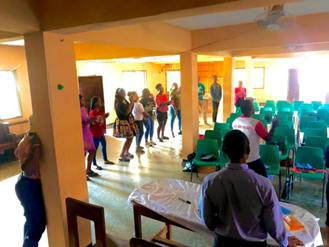Black Opal, a local non-profit organization, in partnership with St. Matthews and Salem Methodist church, and supported by Men’s Association for Gender Equality (MAGE), hosted a youth seminar on 14 September in observance of the International Day of Democracy (IDD). The seminar featured speakers from partner organizations of the MenEngage Sierra Leone Network, as well as governance and youth-led organisations, including MAGE.
Celebrated annually on September 15th, the International Day of Democracy is a day designated by the United Nations for member states and the global citizenry to reflect on the significance of democracy and promote its values around the world.
The seminar was attended by young people from religious groupings in St. Matthews and Salem and youth from the Aberdeen community in western Freetown. They actively engaged in lively discussions on various topics presented and learned about the importance of their role in enriching democracy.
Black Opal’s Executive Director, Hannah Gillen, welcomed the attendees and highlighted the purpose of the event. She explained Black Opal’s work and its operations within the MenEngage Network, including MAGE.
In his address on “The Inclusion of Young People in the Electoral Process,” Sahr Kendema from Campaign for Good Governance emphasized the crucial role youth play in strengthening democracy. He highlighted the vulnerabilities of young people and their exploitation by self-serving politicians to perpetuate violence. Kendema encouraged them to uphold the law and pursue truth, justice, and peace consistently.
At the height of this discussion was the constitutional limitation on the age of presidential candidates. Kendema emphasized that the current 1991 constitution stipulates that individuals under the age of 40 are ineligible to run for the presidency. He urged the youth to consider mobilizing support for a potential amendment to this requirement in the ongoing constitutional review process.
Lawrence Williams, publisher and managing editor of Fritong Post, delved into “The Role of Young People in Conflict Prevention.” He presented democracy as a journey and a destination, achievable through collaborative efforts of the international community, national governments, civil society, and individuals. Williams pointed out that youth are often disproportionately affected by conflicts despite holding untapped potential for peacebuilding.
He shared lessons from Sierra Leone’s brutal civil war, where young people were coerced into joining rebel groups and actively participated in the wanton killings and destruction, resulting in thousands of casualties and displacement. Despite their involvement in these atrocities, Williams commended the youth for eventually becoming agents of change, advocating for an end to hostilities and actively engaging in the peace process and post-conflict reconstruction. However, he cautioned that several underlying factors that triggered the civil war, such as electoral manipulations, politics, corruption, ethno-regional divisions, and tribalism, persist, making it harder to address openly.
He said: “These issues are common knowledge,” he said, “but many people feel they’re too sensitive to talk about.”
He emphasized that young people are not merely victims of conflict but powerful agents of change. By investing in youth-led peacebuilding initiatives, we can foster a future that is more peaceful and prosperous for all, Williams said.
He further stressed the critical role of education in preventing conflicts. This he said requires the youth to challenge conventional thinking and adopt innovative perspectives to address contemporary realities. However, conflict prevention is not a simple task, and it cannot be achieved solely through rhetoric or good intentions, he explained.

“To build peace, we must understand the causes and mechanisms of war and why our civilization has witnessed devastating destruction. Peace education would require a critical and fundamental review of our history.” — Lawrence Williams.
Moreover, Williams outlined specific actions that young people can take to prevent conflict today. These include developing skills in conflict resolution, mediation, and peacebuilding; raising awareness about the importance of youth involvement in peacebuilding; advocating for policies that support their participation; building alliances with other youth groups, civil society organizations, and government agencies; and leveraging technology and social media platforms for connecting, mobilizing, and sharing information related to conflict prevention.
He also highlighted successful examples from Sierra Leone, Liberia, and Rwanda, where investments in youth reintegration programs, education, vocational training, and psychosocial support have helped to significantly reduce youth involvement in violence and widely destructive conflict behaviour.
Abdul Samura, representative from the Centre for the Coordination of Youth Activities (CCYA), elaborated on ‘The Role of the Next Generation (Youth) as Custodians of Democracy’. He highlighted the importance of youth participation in formal political processes, such as voting and engaging with elected officials.
Kamara argued that when young people are excluded from political processes, a significant portion of the population has little influence in decisions that impact their lives. This can lead to disenfranchisement and disengagement, undermining the representativeness of political systems.
He further stressed the importance of civic engagement, which encompasses various activities that promote the quality of life in a community. By participating in civic engagement, youth can become better informed about current events and contribute to positive change.
Kamara concluded his address by stating that active youth participation is crucial for upholding democratic values, ensuring social equity and justice, and building stable and peaceful societies. He called on the electoral management bodies (EMBs) and other stakeholders to promote youth involvement in formal decision-making processes.
Speaking to Gillen after the seminar, she said the event was a success and that she was pleased with the turnout. “We are committed to empowering young people to be active participants in their communities and in our country’s democracy,” she said.




